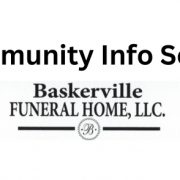It’s something that many of us worry about as we get older and can’t remember things like we once did, but Michael Patterson, a family caregiver specialist for Kerr-Tar COG Agency on Aging breaks down what falls in the “normal forgetfulness” category and what does not.
Patterson was a guest on Wednesday’s TownTalk and previewed some of the information that he will share at the monthly community form series sponsored by the Hon. Charlie Baskerville.
The program “Dementia Friends,” which will begin at 6 p.m. on Tuesday, Apr. 9, is designed to promote awareness about what dementia is and how it affects caregivers and their families who care for those in the grips of dementia.
“When it comes to individuals caring for those with dementia, (I) stress this is a journey,” Patterson said, “a chronic condition.” It’s not like caring for someone with flu – follow doctor’s orders and you’ll be good as new in a week or so.
Some people can live for decades with dementia, and others’ lives are cut short. Whatever the scenario, caregivers carry a heavy load and experience a different relationship with their loved one.
“I work with caregivers to understand that this is a journey,” Patterson said. Self-care is important, he emphasized. What caregivers need to understand is that they are not alone.
A couple of his favorite resources include the Dementia Alliance of NC and Duke Dementia Family Support. Both provide education and support group opportunities; the Duke group offers respite vouchers, as does the KTCOG Agency on Aging.
“Dementia is a brain disease,” Patterson said, but its onset can be triggered by numerous factors, including genetics or other health conditions like hypertension or high cholesterol.
So when your doctor or health care team encourages you to eat right, take your meds and live a healthy lifestyle, a secondary effect could be lowering your risk for any of the types of dementia.
“Dementia is the umbrella and then under it are the other subcategories,” Patterson explained, adding that many people equate dementia with Alzheimer’s.
Granted, Alzheimer’s accounts for between 60 percent and 80 percent of most dementia cases, but it’s not the only type of dementia that researchers have identified.
Now that Baby Boomers are reaching the age of 65-70, this generation of adults that accounts for a larger percentage of the overall population may skew the prevalence for dementia diagnoses.
But, Patterson said, “just because you are getting older, doesn’t mean you’re going to get dementia.”
Memory loss is a normal part of aging, as our mental and physical abilities change over time.
It’s when that memory loss has an adverse impact on your daily living that dementia may be coming into play.
Can’t find your car keys? Normal aging. Can’t remember what the car key is used for? Not normal aging.
If you get in your car to go home but forget how to “get” home, that also could be more than normal aging.
Learn more at the April 9 program, which will be held at Baskerville Funeral Home, 104 S. Chestnut St., Henderson.
Contact Patterson at 252.436.2040, extension 6072.
CLICK PLAY!


